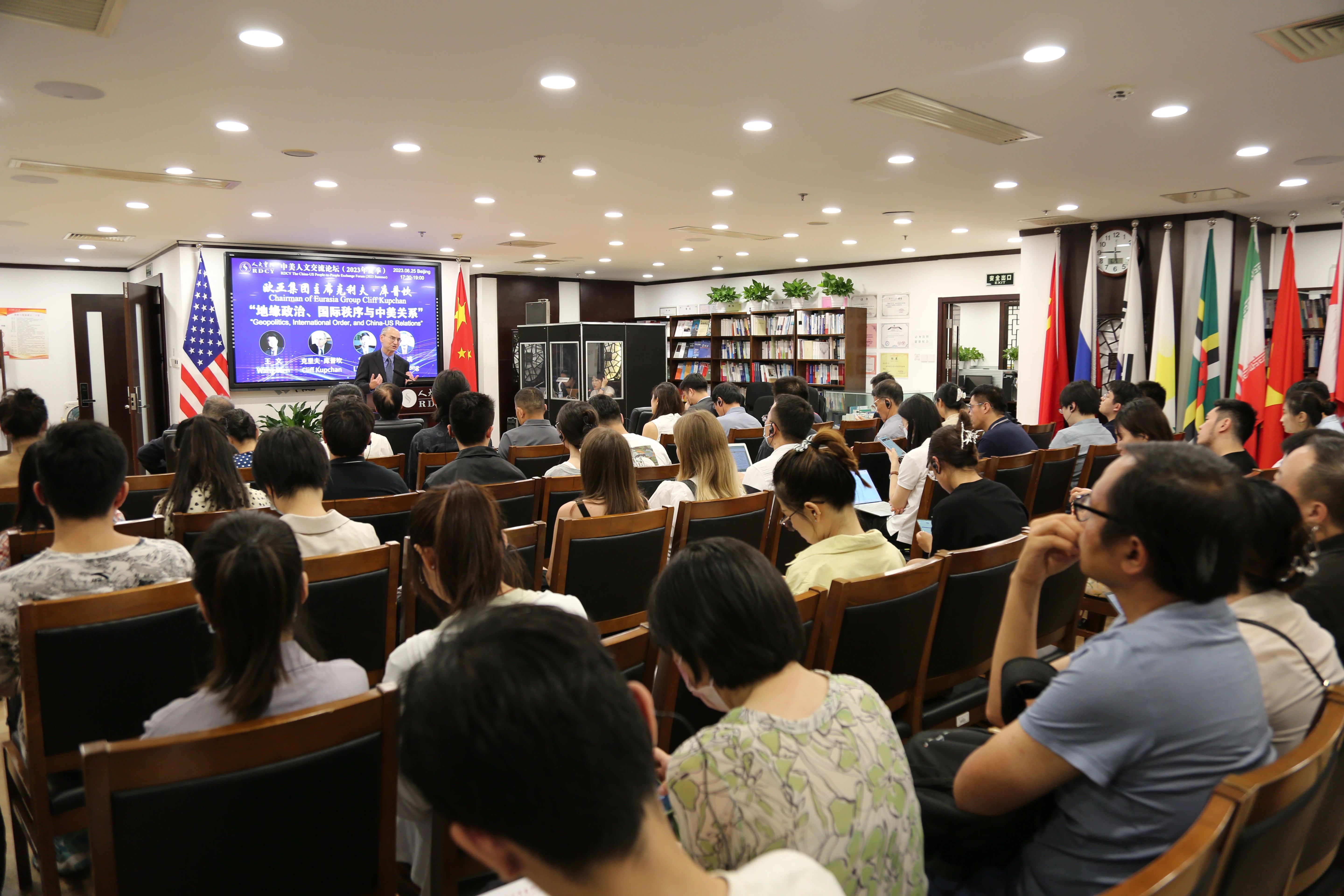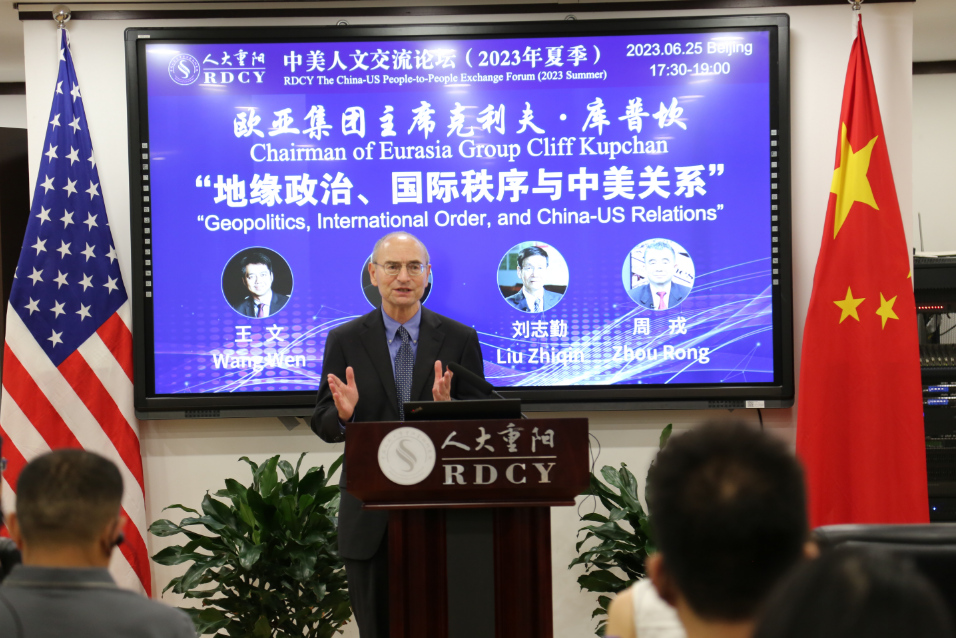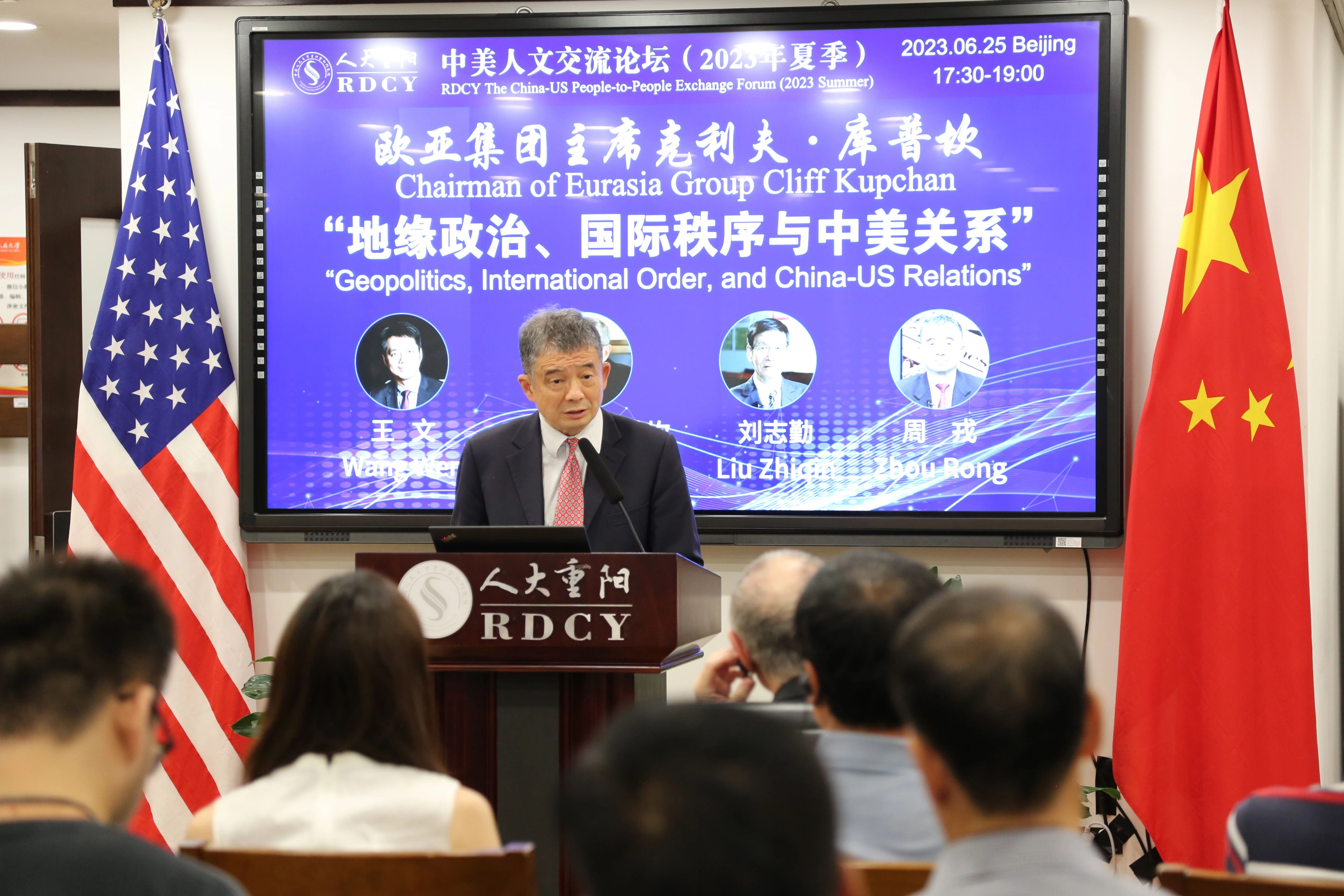LATEST INSIGHTS
Your Present Location: LATEST INSIGHTSChairman of Eurasia Group Mr. Cliff Kupchan delivered a speech on "Geopolitics, International Order, and China-US Relations" in RDCY
Chongyang Institute for Financial Studies at Renmin University of China (RDCY) invited Mr. Cliff Kupchan, a renowned American scholar and chairman of Eurasia Group, to deliver a keynote speech at “the China-US People-to-People Exchange Forum (2023 Summer)”, hosted by RDCY and the China-US People-to-People Exchange Research Center of Renmin University of China, and had an in-depth exchange of views with Chinese experts and scholars on current geopolitics, international order and China-US relations. It is reported that he is the first American expert to speak on site at a Chinese think tank in the past three and a half years since the COVID-19 outbreak. Wide media have covered this forum, including China News, CGTN, Beijing Daily, Haiwainet, Global Times, China Review News, SZTV and Yangze River News of Hubei TV, etc.

Mr. Kupchan expressed gratitude to RDCY in his speech and introduced the complexity of geopolitics. He stated that the current stage is an era of competition between the two superpowers of China and the United States. Both of them have completely different ways of competing or perceptions of the entire world, and they can do a better job of managing the Sino-US relations.

Mr. Kupchan mentioned that, the world has shifted from the "bipolarity" of the Cold War period to a period of "strong unipolarity" (which ended when Trump was elected as president of the USA), and now it has turned into a period of “weaker bipolarity". What China and the United States need to do in such a context of superpower competition is to find a common language to manage competition. Over the past 18 years, some people have been "spoiled", getting used to American ruling the world. Now, it is necessary to prepare for finding a common management language for superpower competition.
Mr. Kupkan believes that China and the United States urgently need to "manage competition". China and the United States are currently “failing” to manage their competition. In addition, China and the United States must attach importance to and restart high-level military dialogue. Mr. Kupkan believes that Blinken's visit to China will allow Sino-US relations to continue on track until November, when there will be a state leaders’ summit meeting between the two countries. However, the future of Sino-US relations is extremely worrying in 2024. A series of factors such as Taiwan's general election have greatly increased the possibility of Sino-US conflicts.
Mr. Kupchan also said that the management of competition between the United States and the Soviet Union during the Cold War may provide a model for China and the United States to manage competition. For example, two weeks after the United States laid mines in Haiphong Port, Vietnam, the United States and the Soviet Union signed the STALT-I agreement, successfully compartmentalizing. In contrast, the superpower competition between China and the United States is not segregated, with a danger of fermentation. For example, during the global pandemic of Covid-19, China and the United States did not cooperate to develop vaccines, which is very regrettable.
Mr. Kupchan pointed to the six "swing states" of the Global South - India, Brazil, Turkey, Indonesia, Saudi Arabia and South Africa - which are members of the global G20 and also have some geopolitical influence. These countries are trying to get the most out of the Sino-US competition. Besides, he also mentioned the issue of geopolitics and artificial intelligence, which is likely to be controlled by technology companies in the future, and they will become more powerful than governments.
Wang Wen, the moderator of the lecture, executive dean of RDCY and executive director of the China-Us People-To-People Exchange Research Center at Renmin University of China, expressed appreciation for Kupchan's forward-looking views, but raised two different ideas. Firstly, China's non-sanction policy against Russia cannot be equated with China's "taking sides" with Russia on the Ukraine crisis. Secondly, in fact, China has given a lot of humanitarian aid to Ukraine. More importantly, China is genuinely promoting peace talks.
Two senior fellow of RDCY, Mr. Liu Zhiqin and Mr. Zhou Rong, commented in the discussion session.
Liu Zhiqin said the impact of technology on young people is significant. Under the complicated international order, more major powers should be encouraged to develop in order to maintain a balanced competition, without which there is no international order.

Zhou Rong believes that swing countries took uncertain positions on China-US issues, and the attitude of developed countries toward China can continue to be observed, for example, China's relations with Britain and France are better than those of Japan and South Korea. As for artificial intelligence, it may be used by terrorism.

At the end of the meeting, Mr. Kupchan answered a number of questions from the audience on China-US relations, China-US economic and trade exchanges, and the Ukraine crisis. The atmosphere was very warm.
Eurasia Group is the world's largest political risk consultancy. Since its inception in 1998, the company has established offices in New York, Washington, London, Tokyo, Sao Paulo and San Francisco, with more than 150 employees. At the same time, the group has established a cooperation network with more than 500 experts from more than 90 countries in Europe, Asia, Africa, the Middle East and Latin America. Eurasia Group is widely credited with leading the systematic introduction of political science to Wall Street. The Group's flagship product, the Global Political Risk Index (GPRI), is the world's first political and economic risk index designed to compare emerging markets.























































































 京公网安备 11010802037854号
京公网安备 11010802037854号





